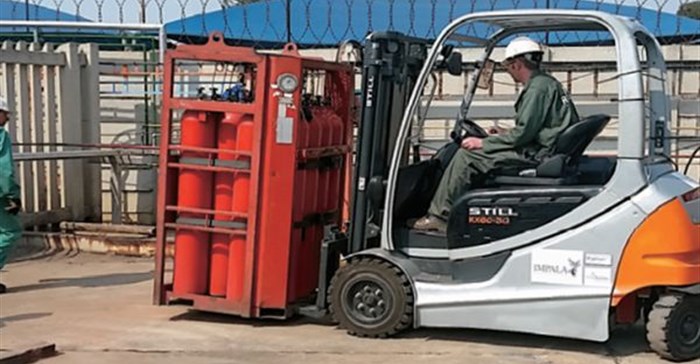Hydrogen fuel cell technology can be the green future of power generation. Two Department of Science and Technology projects are designed to prove the viability of fuel cells developed in South Africa.
The city of Johannesburg's primary healthcare clinic in Windsor East serves a population of 33,000 people. The clinic offers mother and child health services, TB and HIV screening, and provides treatment for HIV-positive and TB patients.

The converted hydrogen forklift at Impala Platinum Refinery is the first of what is hoped is a fleet powered by clean technology. (Image: GCIS)
Like all other clinics, it needs to store its life-giving vaccines at a constant temperature – between two and eight degrees – for them to remain effective. Vaccines are susceptible to swings in temperature, and a steady, reliable power supply to fridges is paramount.
At the Windsor East Clinic, the Department of Science and Technology (DST), along with private sector partners, has piloted a project using a hydrogen fuel cell to provide secure back-up power for the clinic's fridges and air-conditioning system.
Sister Shirley Mapusa of the City of Johannesburg's health department reduces the argument for the technology succinctly. "The battery is always on standby. Even when we are not here. So we can keep the cost of health care low because we do not lose vaccines if there is a power outage."
The hydrogen fuel cell is part of pilot public private sector project to field test the technology and demonstrate real-world applications. Air Products supplies the hydrogen, Clean Energy Investments funded the installation, along with Gridline Construction and Powertech System Integrators, and monitoring of the system.
For the staff at Windsor East, the fuel cell offers peace of mind. Load shedding or a technical fault does not hold the fear that stored vaccines will be spoiled and discarded. They have been able to run their fridges for up to four days without interruption but the system should be able to run for twice that before the supply of hydrogen runs out.
Andre Grzesiak of Air Products points out: "The system's output depends on load. Right now the clinic runs four fridges so the system will run longer on the available hydrogen. The system is designed to allow for the addition of more fridges. More fridges mean more power is generated and the system runs autonomously for fewer days."
Byproducts kept to minimum
The cell is whisper soft once it is running and produces steam, or water, as a byproduct of its operations. There are no noxious fumes produced, as there would be from a diesel generator. "This makes it perfect for this clinic. There is no noise and fumes to upset the neighbours," explains Dr Cosmas Chiteme of the DST.
For Chiteme, leader of the hydrogen fuel cell project at the DST, success of the pilot will ensure equitable access to energy, a more secure and affordable power supply, and a greener energy future. As important, "This is just one of the initiatives to promote a knowledge-based economy. Anchored by the use of hydrogen and the beneficiation of minerals like platinum, HySA (Hydrogen South Africa) with its research partners (Council for Scientific and Industrial Research, University of the Western Cape and University of Cape Town), aims to establish South Africa as a leading exporter of hydrogen and fuel cell technology."
Success would also mean that South Africa would benefit from its mineral wealth and change the lives of its people. "We are piloting fuel cells in Eastern Cape schools. Pupils use them to charge laptops and tablets and it is changing their lives. Hydrogen fuel cells will make a difference in healthcare, education and industry."
Power of the future
Fuel cells use an electro-chemical process as opposed to combustion to produce power. Mining houses see it as the power source of the future because it reduces heat, noise levels and noxious and sulphide emissions produced during operations.
At the Impala Platinum Refinery in Springs, the company is testing a hydrogen cell powered forklift in its warehouse. The fuel cell charges an on-board battery – a metal hydride container – that stores the hydrogen at a 180-bar pressure. "The nickel and cobalt hydride storage unit acts like a sponge. It absorbs hydrogen and releases it when needed."
Chiteme explains that projects such as the Impala forklift and the Windsor East Clinic were endorsed by the government to develop and test high-value commercial products in the sector and beneficiate platinum resources.
And it is working, he believes. "The technology that powers this forklift was developed at the Department of Science and Technology's HySA Systems Centre of Competence based at the University of the Western Cape. We have built a system that stores hydrogen at lower pressures which improves safety and is cheaper."
Emissions are reduced, the only byproduct of the chemical reaction that produces power is water, and it is less noisy than industry standard diesel forklifts. Converted from a diesel lift at a cost of R2m, the hydrogen powered version is also capable of generating the required power for daily operations while requiring refuelling every few days.
The future
South Africa has 75% of the world's platinum reserves; however, beyond its use in catalytic convertors and jewellery, the platinum mined is shipped out of the country in its raw state. The Department of Science and Technology's HySA initiative develops technologies that will beneficiate raw minerals in South Africa.
Chiteme explains: "The HySA strategy is to create expertise and a knowledge-based economy using local resources. For the DST, creating new industries through better use of locally mined minerals helps to build a new knowledge economy that offers better work at better pay. For platinum miners it is about saving the 450,000 jobs in the sector.
The price of platinum is less than half today than it was at its 2008 peak. By developing new technologies and building new industries Impala and the DST is hoping to widen the demand for platinum. Today the biggest market is car manufacturers, which use the metal in the production of catalytic converters.
Catalytic converters, Chiteme explains, have been instrumental in reducing harmful gases produced by internal combustion engines. "Fuel cell technology has the potential to better those results. Not only is this technology green, we can change power generation and grow a market for our mineral resources."
The nascent fuel cell industry uses about 30,000 ounces of platinum a year; the DST believes that it can grow this to 300,000 ounces within a decade as pilot projects such as Windsor East Clinic and Impala Platinum prove successful.




































